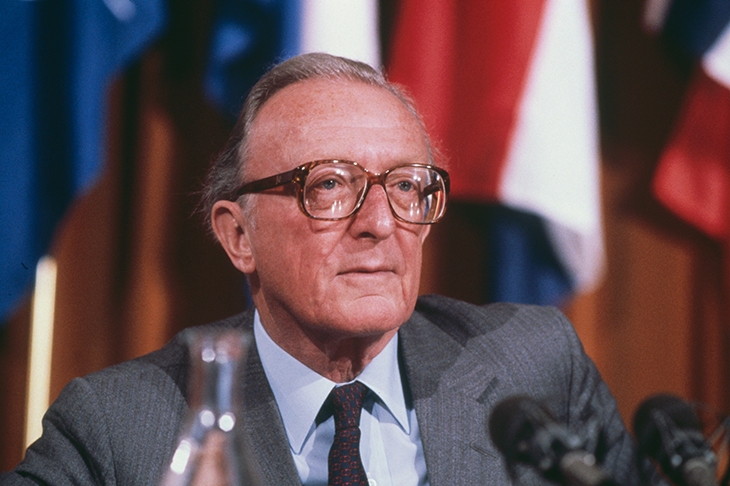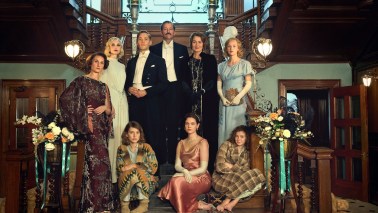‘I’m sorry to bother you, Peter, but you were a famously successful Leader of Their Lordships and I wondered whether you had any tips before I took it on.’
‘All you’ve got to remember is that you are the headmaster of a second-rate public school.’
Lord Carrington’s answer to my enquiry was entirely characteristic: funny, and flattering, as though he knew you would instinctively understand the joke. You and he, he implied, belonged in the same place.
It was a technique which he lavished with great success on those who worked for him. He was much loved in Their Lordships, at the Foreign Office and at the Ministry of Defence — and with reason. He was fun to work for and loyal to those who worked for him. He was widely admired outside his departments and lacked ‘side’. His myriad friends loved him for his company above all, but also for the lustre he brought to their circle.
It would be a mistake to assume that the charm was merely technique. His grand-father had been a celebrated spendthrift, not only getting through his own modest portion and more, but also his rich Australian wife’s. Peter’s father inherited his peerage and estates from his uncle Charlie Lincolnshire after a childhood in Australia. It was therefore perhaps understandable that both Peter and his father wanted to feel they belonged. So, although he was the ultimate insider, like many such he embodied a paradox: he was also an outsider.
Among those institutions which commanded his loyalty none was more important to Carrington than his regiment, the Grenadier Guards, and the second battalion in particular, which in the later stages of the second world war formed part of the Guards Armoured Division. My father and he disagreed over politics, particularly over Rhodesia, but nothing could break the bond of friendship forged in northern Europe in 1944 and 1945, united in their loyalty to their regiment and all its ranks.
His politics reflected both his experience and his temperament. Like other officers, he was understandably shocked to find that many of his guardsmen had joined up in the 1930s for the guarantee of a square meal. He saw the European Union as the way to avoid another catastrophic conflict. He believed in the existing social order. He was Whiggish, paternalistic and fatalistic, but driven by a strong sense of duty.
He found it easy to dislike the distinctly unwhiggish Tory party en masse. Nor could he sympathise with the Loyalists of the Six Counties, feeling as he did that the obvious solution was a united Ireland. His sense of duty led him to take on the chairmanship of the Conservative party and the new Department of Energy when he should have turned them down. All this tempted his critics to suggest that his political objective was the elegant management of decline.
He had a fastidious distaste for the rough and tumble of politics and was distressed by the vitriol that was flung at him following the Rhodesia settlement. During the Falklands crisis, he could have fought John Nott harder over the withdrawal of HMS Endurance, and he showed in the run up to his resignation that never having been an MP was a serious handicap.
The parliamentary party had not been reassured by Margaret Thatcher’s and John Nott’s performances in the afternoon debate. As they reassembled in Committee Room 14 to listen to Carrington and Whitelaw, you could smell the fear in the room: they were about to lose their seats as a result of a national humiliation. They were looking to these two gallant guardsmen for rallying speeches and reassurance.
Carrington spoke first and mistakenly assumed he was addressing an audience of rational beings rather than a rabble in a funk. He started by saying something like: ‘Well you’ve heard what the prime minister and John Nott had to say in the debate. I have not got anything particular to add, but if you would like me to answer any questions….’ There was a growl of frightened rage and Carrington, realising his mistake, made a sensible speech. But he had lost his audience. As he left the room he saw me in the corridor and said: ‘That didn’t go too well. I’ll certainly have to resign now.’
A former MP could not have fallen into that trap. In this book, Christopher Lee suggests that some elements of the party were exacting their revenge for Rhodesia. But the real reason for Carrington’s failure was that he did not understand the House of Commons.
The charm did not always work abroad either. Many Americans deeply distrusted Carrington, regarding him as anti-Israel and an author of the Venice Declaration. His attempts to agree a settlement with Malta under Dom Mintoff failed as well. However, another insider/outsider, Henry Kissinger, admired and liked him.
Lee’s book benefitted from the co-operation of his subject and has been produced immediately after his death. A less hurried edition would have eliminated a number of unimportant but irritating errors, and the first and second chapters fail to give a lucid explanation of a complicated family history.
Nevertheless, the subsequent account of Carrington’s life is clear and fair. It is far from being a hagiography. Lee discusses carefully the things that did not go well: Crichel Down, Vassal, the former Yugoslavia, the chairmanship of the Conservative party, the Department of Energy, the Victoria and Albert Museum. He spots Carrington’s reluctance to reform the Ministry of Defence, which he knew was needed, and his lack of real interest in the House of Commons and the constituency side of politics. This was perhaps partly prompted by his hatred of bad manners.
However, he also sees Carrington as an honourable man. He understands the dilemma Carrington faced in Rhodesia and admires his toughness in negotiating a settlement which got the British out, kept the Americans and the Commonwealth on side, but which left Zimbabwe to the disaster of the Mugabe regime.
And Lee explains why Carrington thought House of Lords reform was necessary. Thanks to two House of Commons men, Powell and Foot, he failed there, but he was not alone in that.
Carrington was a private man, blessed in the closeness of his marriage, who enjoyed being a public figure. All who knew him were happy to brag about their friendship with him. He served his country and its institutions for three-quarters of a century as a practical man of affairs. Like the late Duchess of Devonshire, he became a national institution, because, like her, he was a class act. Christopher Lee conveys much of this.





Comments